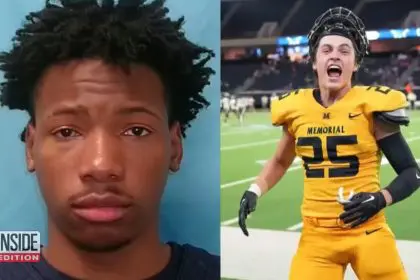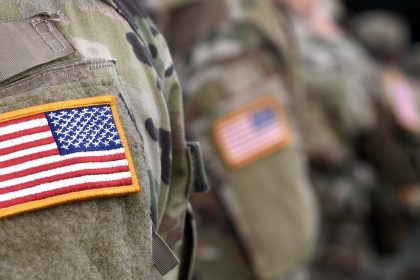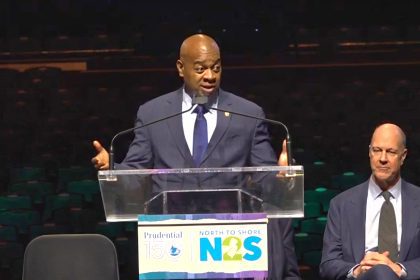A Texas community remains shaken after a grand jury formally indicted teenager Karmelo Anthony on first-degree murder charges in connection with the fatal stabbing of 17-year-old Austin Metcalf during what should have been a routine school track meet in April.
The devastating incident has left families torn apart, a school district grappling with tragedy, and a broader community searching for answers about how a high school athletic event could turn deadly in a matter of moments.
Collin County District Attorney Greg Willis announced the indictment on June 24, marking a significant step forward in a case that has captured national attention and highlighted the complex issues surrounding youth violence and school safety. The formal charges come after weeks of careful evidence review by grand jurors who ultimately determined there was sufficient cause to move forward with the most serious criminal charge possible.
Anthony, who was also 17 at the time of the April 2 incident in Frisco, Texas, now faces the possibility of life in prison if convicted on the first-degree murder charge. The case will proceed through the court system as both prosecution and defense teams prepare for what promises to be a closely watched trial.
A community forever changed
The impact of this tragedy extends far beyond the immediate families involved, touching every corner of the Collin County community and resonating with parents, students, and educators across the nation. District Attorney Willis acknowledged the profound effect the case has had on local residents and beyond.
The stabbing occurred during what witnesses described as a dispute between the two teenagers at the track meet, transforming an event meant to celebrate athletic achievement into a scene of unimaginable horror. School resource officers and emergency responders rushed to the scene, but despite their quick response, Austin Metcalf succumbed to his injuries.
The incident has prompted intense discussions about security at school sporting events, conflict resolution among young people, and the factors that can escalate teenage disagreements into life-altering violence. Educational leaders across Texas have been forced to examine their own safety protocols and consider additional measures to protect students during extracurricular activities.
Details emerge from the investigation
According to arrest warrant documents obtained during the investigation, the confrontation between Anthony and Metcalf unfolded rapidly during the track meet. A school resource officer who arrived first on the scene immediately instructed Anthony to raise his hands, prompting the teenager to respond that he had been protecting himself.
Anthony reportedly acknowledged the stabbing to the responding officer and expressed concern about Metcalf’s condition, asking whether the victim would survive his injuries. These immediate statements have become central pieces of evidence as the case moves toward trial, with both sides likely to interpret Anthony’s words differently.
The investigation involved extensive interviews with witnesses who were present at the track meet, review of any available video footage from the event, and careful examination of physical evidence from the scene. Grand jurors considered all available evidence before reaching their decision to formally charge Anthony with first-degree murder.
Law enforcement officials have worked diligently to piece together the exact sequence of events that led to the fatal stabbing, though many details remain sealed as the case progresses through the legal system. The thorough investigation reflects the serious nature of the charges and the community’s demand for a complete understanding of what transpired.
Self-defense claims complicate the case
Anthony’s legal team has consistently maintained that their client acted in self-defense during the confrontation with Metcalf. Defense attorney Mike Howard released a video statement following the indictment, expressing confidence in the justice system while outlining their planned defense strategy.
The self-defense claim introduces significant complexity to the prosecution’s case, as Texas law allows individuals to use force, including deadly force, under certain circumstances when they reasonably believe it is necessary to protect themselves from imminent harm. However, the law also requires that the response be proportional to the threat faced.
Howard indicated that the defense team believes the full story of the incident will raise reasonable doubt about whether Anthony’s actions constituted murder or justifiable self-defense. This approach suggests the trial will likely focus heavily on the specific circumstances of the confrontation and whether Anthony’s response was legally justified.
The burden will fall on prosecutors to prove beyond a reasonable doubt that Anthony’s actions constituted murder rather than self-defense. This requirement means the trial will likely involve detailed testimony about the physical altercation, the relationship between the two teenagers, and the specific moments leading up to the fatal stabbing.
A father’s quest for justice
Jeff Metcalf, Austin’s father, has become a voice for his son’s memory throughout the legal proceedings. Following the indictment announcement, he expressed satisfaction that the case is moving forward while acknowledging that no legal outcome could bring his son back.
The grieving father has described Austin as a bright young man with tremendous potential, emphasizing his son’s commitment, dedication, and leadership qualities. These character descriptions paint a picture of a teenager whose life was cut short just as he was beginning to realize his dreams and ambitions.
Jeff Metcalf established a fundraising page to help cover expenses related to his son’s death and to preserve Austin’s memory. Through these efforts, he has shared details about his son’s personality and achievements, helping the community understand the magnitude of the loss.
The father’s statements following the indictment reflect both his desire for justice and his recognition that the legal process, while necessary, cannot undo the tragedy that has forever altered his family’s life. His continued participation in the proceedings demonstrates his commitment to seeing the case through to its conclusion.
Family impact extends beyond immediate tragedy
The ripple effects of this case have impacted both families involved, creating additional trauma and stress during an already difficult time. Anthony’s mother, Kala Hayes, spoke publicly about the harassment and threats her family has received since the incident, highlighting how high-profile criminal cases can affect entire families.
Hayes emphasized that her younger children and husband bear no responsibility for the events that occurred at the track meet, yet they have faced ongoing harassment from community members and online critics. This secondary victimization illustrates how criminal cases can create multiple layers of suffering that extend far beyond the immediate participants.
The public attention surrounding the case has created additional challenges for both families as they navigate their grief and legal obligations while dealing with media scrutiny and community reaction. Social media has amplified both support and criticism, creating an environment where families struggle to process their emotions privately.
These broader impacts underscore the complex nature of high-profile criminal cases involving young people, where entire families become unwilling participants in public discussions about justice, responsibility, and consequences.
Legal proceedings move forward
With the formal indictment now in place, the case enters a new phase focused on trial preparation and legal strategy development. Both prosecution and defense teams will spend the coming months gathering additional evidence, interviewing witnesses, and preparing their respective arguments for presentation to a jury.
The prosecution will work to build a comprehensive case demonstrating that Anthony’s actions constituted first-degree murder, while the defense will focus on establishing reasonable doubt and supporting their self-defense claims. This preparation phase is crucial for both sides as they work to present compelling arguments to jurors.
Court scheduling will determine when the trial actually begins, though complex murder cases often take months or even years to reach trial due to the extensive preparation required. Both families will likely endure a prolonged period of uncertainty as the legal process unfolds.
The trial itself will provide the first opportunity for the complete story of the incident to be presented publicly, as both sides present their evidence and arguments to a jury of Collin County residents who will ultimately determine Anthony’s fate.
Broader implications for school safety
This tragic incident has prompted renewed discussions about safety measures at school sporting events and other extracurricular activities. Educational leaders are examining whether current security protocols are adequate to prevent similar tragedies and protect students during school-sponsored events.
The case has also highlighted the importance of conflict resolution programs and intervention strategies designed to help young people manage disputes before they escalate to violence. Many schools are reviewing their approaches to teaching students how to handle disagreements and seek help when conflicts arise.
Mental health resources and support services for students have also become focal points of discussion, as communities recognize the need for comprehensive approaches to preventing youth violence. The tragedy serves as a reminder that schools must address not only academic needs but also the social and emotional challenges facing today’s teenagers.
These broader conversations reflect a community’s determination to learn from tragedy and implement changes that might prevent similar incidents in the future, even as they acknowledge that no system can eliminate all risks.

















